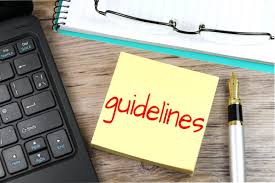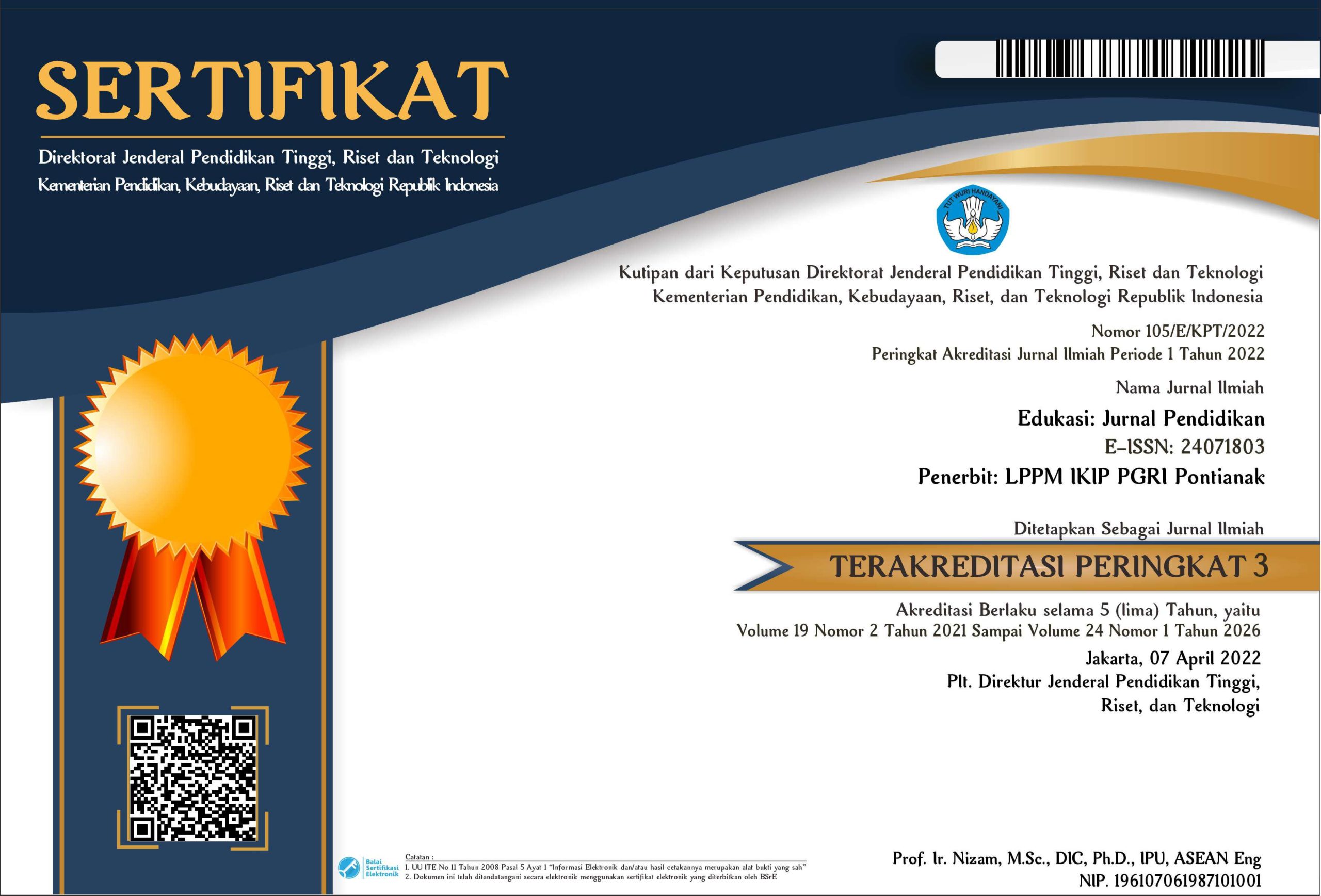Pendekatan Evaluasi Program Tyler: Goal-Oriented
DOI:
https://doi.org/10.31571/edukasi.v18i1.1644Keywords:
evaluasi program, orientasi tujuan, pendekatan Tyler, evaluation program, goal-oriented, Tyler approachAbstract
Abstrak
Beragam model yang diterapkan guna menyurvei program maupun kegiatan di berbagai bidang, seperti bidang hukum, pollitik, budaya, pendidikan, serta ekonomi. Evaluasi program pendidikan ialah prosedur penggambaran, menghimpun data/fakta serta penyajian informasi untuk pengambil kesimpulan selanjutnya akan digunakan untuk mempertimbangakan program tersebut, perlukah dibenahi, disudahi ataupun diteruskan. Menurut pandangan Ralph W Tyler, evaluasi sebagai suatu proses untuk memastikan sampai terealisasi atau tidaknya suatu goals. Penetapan terealisasi atau tidaknya goals, dirumuskan dalam tujuh tahap/langkah evaluasi berorientasi tujuan oleh Tyler. Tujuan penulisan artikel adalah untuk menggambarkan konsep/ide, tahap serta goals dari evaluasi menurut Ralph W Tyler. Evaluasi merupakan kegiatan penelaahan petunjuk secara terstruktur untuk memberikan sebuah keputusan atau nilai, telah atau belum tercapainya tujuan yang diharapkan.
Â
Abstract
There are many models applied to enlarge programs/activities in various fields, both in the fields of law, politics, culture, economics, and education. Evaluation of educational programs about the process of drawing, gathering facts / data and presenting data / information to gather conclusions which will then be used as an consideration of the program, should be fixed, ended or continued. Ralph W Tyler from one of the most popular educational figures. In his view, evaluation is a process to decide whether realisation the goal or not. Determination of whether realization or not a goal, formulate in seven firm / goal-oriented evaluation steps by Tyler. The purpose of reading this article is to explain the concepts, steps and goals of the assessment according to Ralph W Tyler.
Downloads
References
Adjadan, S. 2015. Evaluasi Program Pendidikan dan Pelatihan Calon Kepala Sekolah (Studi Evaluatif Pascadiklat di LPMP Provinsi Maluku Utara). Jurnal Evaluasi Pendidikan, 17(3): 164-175.
Ambiyar & Muharika. D. 2019. Metodologi Penelitian Evaluasi Program. Bandung: Alfabeta.
Ananda, R. & Rafida, T. 2017. Pengantar Evaluasi Program Pendidikan. Medan: Perdana Publishing.
Arikunto, S. 2005. Evaluasi Program Pendidikan. Jakarta: Bumi Aksara.
Arikunto, S. 2004. Dasar-Dasar Evaluasi Pendidikan. Jakarta: Bumi Aksara.
Arikunto, S. & Jabar, C. S. A. 2009. Evaluasi Program Pendidikan: Pedoman Teoretis Praktis bagi Mahasiswa dan Praktisi Pendidikan. Jakarta: Bumi Aksara.
Daryanto, 2008. Evaluasi Pendidikan. Jakarta: Rineka Cipta.
Fitzpatrick, J. L., James, R. S. & Blaine, R. W. 2004. Program Evaluation Alternative Approaches and Practical Guidelines. Pearson Education Inc: Boston.
Gall, M. D., Gall, J., & Borg, W. R. 2007. Educational Research: An Introduction. New York: Pearson Education.
Lazwardi, D. 2017. Implementasi Evaluasi Program Pendidikan di Tingkat Sekolah Dasar dan Menengah. Al-Idarah: Jurnal Kependidikan Islam, 7(2): 142-156.
Mardapi, D. 2000. Evaluasi Pendidikan. Makalah disampaikan pada Konvensi Pendidikan Nasional tanggal 19–23 September 2000 di Universitas Negeri Jakarta.
Musa, S. 2005. Evaluasi Program Pembelajaran dan Pemberdayaan Masyarakat. Bandung: Y-Pin Indonesia.
Munthe, A. P. 2015. Pentingya Evaluasi Program di Institusi Pendidikan: Sebuah Pengantar, Pengertian, Tujuan, dan Manfaat. Jurnal Scholaria, 5(2):1–14.
Muryadi, A. D. 2017. Model Evaluasi Program dalam Penelitian Evaluasi. Jurnal Ilmiah PENJAS, 3(1): 1-16.
Oriondo, L. L. & Eleanor, M. D. A. 1998. Evaluating Educational, Outcomes. Manila: Rex Book Store.
Tayibnapis, F. Y. 2008. Inovasi Program dan Instrumen Evaluasi untuk Program Pendidikan dan Penelitian. Jakarta: PT Rineka Cipta.
Tyler, R. 1950. Models of Teaching. New Yersey: Prentice-Hall, Inc. Englewood Cliffs.
Thorndike, R. M., Cunningham, G. K., Thorndike, R. L., & Hagen, E. P. 1991. Measurement and Evaluation in Psychology and Education (5th ed.). New York: Macmillan Publishing Co, Inc.
Wholey, S. J. 2010. Handbook Of Practical Program Evaluation. San Fransisco: Jossey-Bass.
Downloads
Published
How to Cite
Issue
Section
License
Authors who publish in this journal agree to the following terms:
- Authors retain copyright and grant the journal the right of first publication with the work simultaneously licensed under a Creative Commons Attribution License (CC-BY-NC) that allows others to share the work with an acknowledgment of the work's authorship and initial publication in this journal.
- Authors are able to enter into separate, additional contractual arrangements for the non-exclusive distribution of the journal's published version of the work (e.g., post it to an institutional repository or publish it in a book), with an acknowledgment of its initial publication in this journal.
- Authors are permitted and encouraged to post their work online (e.g., in institutional repositories or on their website) prior to and during the submission process, as it can lead to productive exchanges, as well as earlier and greater citation of published work.

 Download: 17938
Download: 17938


















